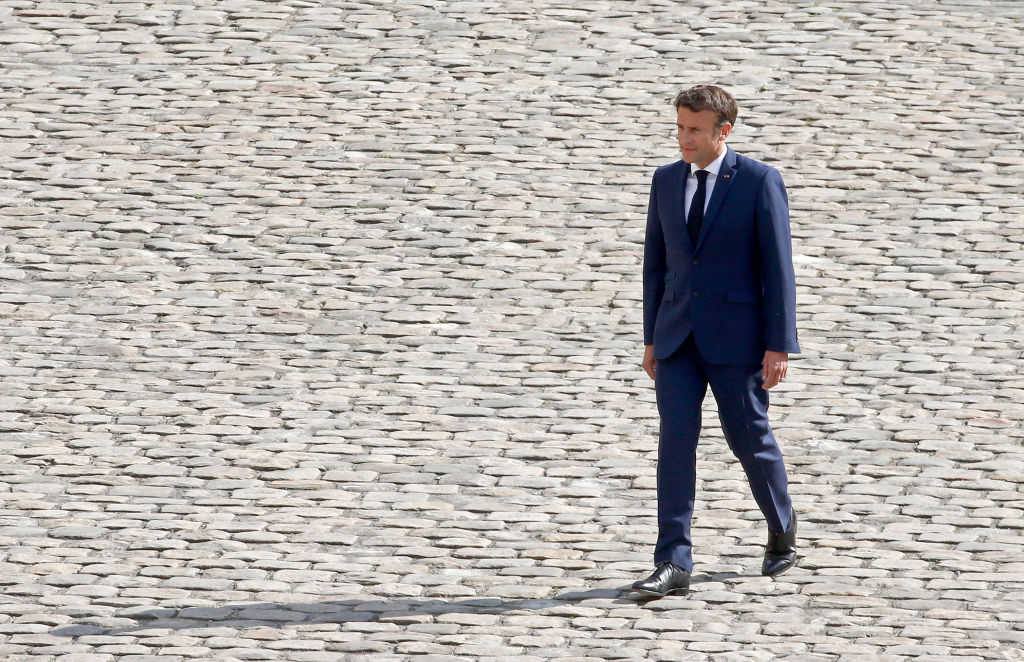The broad condemnation of Israel’s war of necessity delegitimizes the accusers, not Israel.
The End of Europe

The West is overrun with migrants.
On June 8, the picturesque city of Annecy, nicknamed “the Pearl of the French Alps,” was convulsed with terror when a knife-wielding man attacked a group of preschool children in a park, at least one of whom was sat strapped into a pram. Four children and two adults were seriously injured. The attack, which was partially filmed by bystanders, horrified France—and the world. The attacker was a Syrian asylum seeker.
In recent years, France has seen a number of attacks by migrants, but to call them “attacks” minimizes the nature of the brutality involved. People aren’t just physically assaulted in the sense most Europeans are familiar with: a punch, a kick, or a push. They are stabbed repeatedly without warning or mercy. They’re run over at high speed while walking on the sidewalk. Some are even beheaded in public. In October of 2020, a French secondary school teacher by the name of Samuel Paty had his head chopped off on the streets of Éragny-sur-Oise, a Parisian suburb. The Chechen attacker in that case was an Islamic extremist called Abdoullakh Abouyezidovich Anzorov. He attacked Paty with a meat cleaver.
Some 500 miles away, in Germany, migrants and refugees regularly carry out abhorrent crimes. On the very same day as the attack in Annecy, Bild, one of Germany’s leading papers, published a shocking story involving an Eritrean who dismembered another Eritrean, before dumping the victim’s body in the forest.
Jan Karon is a German journalist who covered this particular story and many other similar stories. “Europe in general and Germany in particular have become the sad scene of escalating migrant violence,” he says. “Hardly a day goes by without a large number of cases, which often only appear in the local news, showing the upheavals in migration policy.” According to Karon, “Arab clans” now regularly clash on the streets of Essen, a city in western Germany
His home country, Karon laments, “has created a severe self-made security problem with its ‘humanitarian’ and very open refugee policies.” Germany has granted refuge to more than 2.5 million people since 2015, primarily from the Middle East and Africa.
Many arrivals have, as we might expect, totally alien attitudes toward violence. As Karon notes, with some understatement, “they have experienced a socialization that is often at odds with civilized and highly digitalized life in Central and Western Europe.”
Stabbings, machete attacks, gang fights, and gang rapes have, until recently, hardly been a prominent feature of daily life for Europeans, but they’re par for the course in war-wracked, poverty-stricken non-Christian countries like Syria, Somalia, and Afghanistan. According to Karon, all four styles of attacks “have risen sharply and are almost never committed by Germans.” In Dortmund, four black youths recently sexually molested two girls, ages 11 and 14, on a train, forcing them to undress and bare their bodies. In Germany, gang-rapes are at an all-time high. The vast majority of the rapes are carried out by foreigners.
We could continue and provide an entire litany of dreadful crimes committed across the length and breadth of Europe by migrants. We could talk about the hundreds of bombings that take place every year in the northern utopia that was once Sweden. Or we could talk about the plight of certain Irish cities, where Ed Sheeran would be just as likely to find himself face to face with an African machete gang as a pretty little Galway girl with a fiddle in her hand (since June of last year, Ireland has seen a staggering 960 percent increase in immigration). The real issue is not establishing whether these crimes are taking place and where, but asking what’s going to be done about them.
The obvious thing to do would be to deport all foreign-born criminals and reduce immigration significantly. But in a continent where mass immigration has been the norm for decades, and is still seen as the answer to long-term economic and demographic decline—not to mention a moral imperative that will make European societies better, i.e., less white and therefore less racist—this is easier said than done.
However demoralizing the general effect of seeing video after video of our fellow countrymen and women being stabbed, run over, raped, and sexually assaulted may be, the fact that we’re now starting to see and hear more about such crimes is, perversely, a promising sign. For decades, coverage of the “downsides” of immigration was severely limited and subject to harsh social, and sometimes even legal, sanction. That sanction remains, but with the rise of the internet and social media, as well as growing popular outrage, it’s proving impossible to keep a lid on these crimes.
The mood is changing across Europe. Opinion polls now suggest that, in many European countries, the public feels that immigration has gone too far. The vast majority of Irish citizens believe the country has taken in more asylum seekers than it can handle. In the U.K., anger over decades of mass immigration was one of the principal causes of the Brexit referendum and vote to leave the E.U. The news that, three years after officially leaving the E.U., Britain has not regained control over its borders, as was promised, but is instead letting in record numbers of migrants—over 500,000 a year now, net—has only caused that anger to intensify. Academics and liberal outlets like the Guardian attempt to spin polls about attitudes to immigration, but over a third of British people surveyed now believe the U.K. needs to close its borders totally to refugees. Although attitudes to legal migration for economic purposes may still remain relatively positive in the U.K., it’s clear that an ever-larger number of people believe there are simply too many people being let in each year.
Translating a popular mandate into action has not been easy, even for supposedly receptive administrations like the current Conservative government in the U.K., which has had 13 years to do something about the massive numbers it inherited from the Labour Party, but has instead encouraged immigration to reach record highs. Still, some European countries have now made a determined volte-face and are heading down the road of immigration restriction. The example of Hungary, the most steadfast of anti-immigrant nations in Europe, now has some surprising imitators, including multiple Scandinavian nations. The Danish Social Democrats, a leftist party by all accounts, have been branded “far right” because of their new strict immigration policies, which have the backing of almost all the other parties in the national parliament. Around a week ago, the new Finnish coalition government announced a “paradigm shift,” as it aims to halve the number of refugees the country accepts and to tighten conditions for residency and claiming social security benefits, which remain a huge pull factor for migrants. The government is also looking to penalize gang activity, with shootings and bombings now regular occurrences, as they are in neighboring Sweden.
Even as more nations within Europe swing toward immigration restriction, they will experience powerful resistance, not least of all from the E.U. itself. In the face of a return to pre-pandemic levels of migration into Europe across the Mediterranean and through the Balkans in particular, the E.U. has announced plans to impose mandatory migrant quotas on member states. What’s more, there will be fines for nations that refuse. Hungary and Poland have already indicated that they will not comply with these measures. Victor Orban’s call that “the Germans should be right in Germany and…the Hungarians in Hungary”—i.e., a call for nations to decide their own immigration policy—is unlikely to be heeded by Brussels. It’s entirely possible that nations like Hungary and Poland could leave the E.U. if Brussels attempts to force them to accept large numbers of migrants they don’t want.
Then there’s climate migration. At the World Economic Forum’s annual meeting in Davos this year, Al Gore gave a blustering speech in which he claimed that Western nations will soon lose their capacity for self-governance, as a gigantic wave of over a billion Third-World migrants, all fleeing climate change, breaks over us. The idea that billions of people are going to have to migrate to avoid the effects of catastrophic warming is now being heavily promoted not just by politicians like Al Gore and organizations like the WEF, but also by activists and writers like Gaia Vince, in her book Nomad Century. And since we in the West are responsible for climate change, we must accept these people with open arms. In fact, we should encourage them to come here now, before climate change makes their nations uninhabitable.
As insane as the idea of rehousing most or all of the Third World in the West may sound, especially in advance of an event that many people still don’t believe will happen as described, we have every good reason to believe our leaders will try. Precedents for climate migration have now been established in international law at the U.N., and Western leaders have already accepted moral responsibility for climate change by giving their assent to “climate reparations” for nations like the Maldives and Vanuatu.
If the future is uncertain, one thing is clear at least: regaining their sovereignty and their safety will not be easy for the long-suffering peoples of Europe.
The American Mind presents a range of perspectives. Views are writers’ own and do not necessarily represent those of The Claremont Institute.
The American Mind is a publication of the Claremont Institute, a non-profit 501(c)(3) organization, dedicated to restoring the principles of the American Founding to their rightful, preeminent authority in our national life. Interested in supporting our work? Gifts to the Claremont Institute are tax-deductible.
France deserves better than a politics of technocratic Europhilia.
Budapest’s populist conservatism may foreshadow a post-midterms recovery.
Italy’s new prime minister has steered a shrewd course.
America’s decline is not irreversible.
Donald Tusk’s coalition government represents the authoritarian face of the new “anti-authoritarian” movement.






